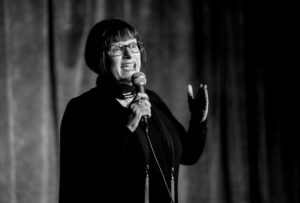 Until a few days ago, Hannah Gadsby wasn’t on my radar. But now I’m seeing her name everywhere.
Until a few days ago, Hannah Gadsby wasn’t on my radar. But now I’m seeing her name everywhere.
She is – or should I say was – a stand-up comedian. She came to my attention when a participant on the Storytelling for Self-Promotion course I’m currently co-facilitating recommended that I watched Hannah’s new comedy special on Netflix.
I wouldn’t usually watch a stand-up set on TV (I prefer the live experience) but I was told this was different – very different. It starts out as a stand-up set, but then morphs into something raw, personal and – gasp – not even funny.
So I watched it. To begin with, she jokes about being a lesbian, about coming from Tasmania (where homosexuality was illegal until 1997), about homophobia, about dealing with uninformed (male) opinions about art history (a subject she happens to know a lot about), about the time a man threatened to beat her up when he mistook her for a bloke hitting on his girlfriend (apparently he “didn’t hit women”), about her “coming out” story.
Some of it is funny, some laugh-out-loud hilarious; all of it is very well observed and delivered with a disarming smile.
But what’s really going on is that’s she’s setting up the audience – lulling them into a false sense of security.
Midway through, her tone changes. She’s not smiling any more. She’s speaking with a fiery dose of anger and conviction.
“I do think I have to quit comedy,” she says. “I built a career out of self-deprecating humour. And I don’t want to do that any more. Because do you understand what self-deprecation means when it comes from somebody who already exists in the margins? It’s not humility. It’s humiliation. I put myself down in order to speak.”
She then begins to deconstruct the manipulative two-step process of stand-up – the setup, which is all about creating tension; and the punchline, which is about breaking it. The problem is, she says, that this leaves no space for an ending.
“The way I’ve been telling my story is through jokes,” she explains. “And stories, unlike jokes, need three parts: a beginning, a middle and an end.”
She then revisits some of her earlier jokes, but rather than give you the punchline, she gives you the endings – and some are devastating.
They’re not funny, but they’re true.
“I just needed my story heard, felt and understood,” she says. “Comedy has frozen my trauma. My story has value. I will not allow my story to be destroyed. What I would have done to have heard a story like mine – to have felt less alone.”
She returns to the story of the man who didn’t beat her up because he “doesn’t hit women”. But the true story didn’t have a happy ending. He came back after their original encounter and said: “Oh no, I get it – you’re a lady faggot. I’m allowed to beat the shit out of you.” And so he did – and nobody stopped him.
She goes on to describe a series of similarly horrifying incidents, mostly rooted in homophobia and misogyny.
There’s no relieving of tension through laughter here. The audience is stunned into silence.
“I’m not helping you any more,” she tells them. “Because this tension is what ‘not-normals’ carry inside of them all the time, because it’s dangerous to be different.”
All the while, the camera is focusing unflinchingly on Hannah’s face. You cannot look away.
In a final howl of turning wounds into wisdom, she declares: “There is nothing stronger than a broken woman who has rebuilt herself.”
At the end of the 70-minute show, you have felt every emotion with her. You have been a witness to the truth of her story.

A few days after watching this tour de force, I had a lightbulb moment. Last year I did a stand-up/improv course and wondered why I found writing a stand-up routine so challenging. I thought it was similar to storytelling, but it’s not. You never get to tell the whole story. You have to twist the truth or at least play fast and loose with it in order to land the punchlines.
My five-minute stand-up set (which I performed in a Soho nightclub) was full of convoluted setups and punchlines related to turning 60.
I did get a few laughs but the jokes masked the real story – which was that I felt sad and scared about turning 60, that my (much younger) husband – the one I thought I would be with for life – was no longer in my life, and how vulnerable that made me feel. All sacrificed on the altar of comedy.
My story is not filled with the deep trauma that Hannah Gadsby had to endure. But if I’d actually had the courage to talk about my sadness and fear about ageing, it might have helped someone in a similar situation feel a little less alone.
Hannah reminded me that every part of my story has value. It deserves to be shared, not left untold or destroyed by my own shame or reluctance to feel vulnerable. She powerfully modelled the raw power of sharing your truth – and that’s why everyone is talking about her.
Leave a Reply